

Poster teacher strategies finished. Poster teacher strategies finished. Bibliography teaching strategies extra ref. Bib for teaching strategies. Bib for teaching strategies. Outstanding Formative Assessment – its impact upon Ofsted for Jan 2012. An Error Occurred Setting Your User Cookie. Checking for Understanding: Formative Assessment Techniques for Your Classroom - Douglas Fisher, Nancy Frey.
Douglas Fisher's latest book with Heinemann is Background Knowledge, coauthored with Nancy Frey.
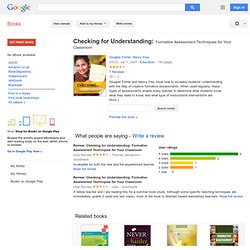
It continues their exploration of the connection between language and learning. Their previous two Heinemann titles, Word Wise & Content Rich, Grades 7-12 and Learning Words Inside & Out, Grades 1-6, have helped teachers nationwide implement a five-part framework for building students' vocabulary. With word learning so important to comprehension, Background Knowledge takes the next step toward deeper understanding. In fact, Doug and Nancy are long-time collaborators, and they have focused on supporting deep understanding and improved literacy across the content areas in three other books: Checking for Understanding, Better Learning Through Structured Teaching, and Improving Adolescent Literacy. They are both classroom teachers and faculty members at San Diego State University and Health Sciences High & Middle College.
50740_ch_14. Summative Assessment Definition. Summative assessments are used to evaluate student learning, skill acquisition, and academic achievement at the conclusion of a defined instructional period—typically at the end of a project, unit, course, semester, program, or school year.
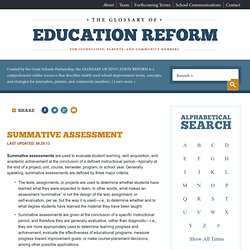
The Fundamentals of Formative Assessment. Definition of Summative Assessment. The Value of Formative Assessment. The current wave of test-based "accountability" makes it seem as though all assessment could be reduced to "tough tests" attached to high stakes.
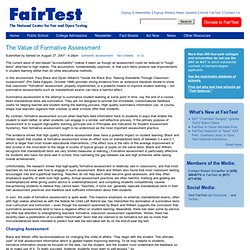
The assumption, fundamentally unproven, is that such tests produce real improvements in student learning better than do other educational methods. In this environment, Paul Black and Dylan Wiliam's "Inside the Black Box: Raising Standards Through Classroom Assessment" (Phi Delta Kappan, October 1998) provides strong evidence from an extensive literature review to show that classroom "formative" assessment, properly implemented, is a powerful means to improve student learning -- but summative assessments such as standardized exams can have a harmful effect. Summative assessment is the attempt to summarize student learning at some point in time, say the end of a course.
Most standardized tests are summative. v14n7. Formative Assessment Classroom Techniques (FACTs) Formative vs Summative Assessment - Teaching Excellence & Educational Innovation - Carnegie Mellon University. Formative assessment The goal of formative assessment is to monitor student learning to provide ongoing feedback that can be used by instructors to improve their teaching and by students to improve their learning.
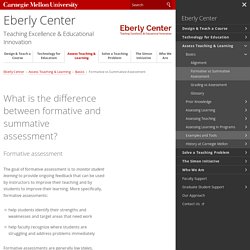
More specifically, formative assessments: help students identify their strengths and weaknesses and target areas that need workhelp faculty recognize where students are struggling and address problems immediately Formative assessments are generally low stakes, which means that they have low or no point value. Examples of formative assessments include asking students to: draw a concept map in class to represent their understanding of a topicsubmit one or two sentences identifying the main point of a lectureturn in a research proposal for early feedback Summative assessment The goal of summative assessment is to evaluate student learning at the end of an instructional unit by comparing it against some standard or benchmark. a midterm exama final projecta papera senior recital.
Examples of Formative Assessment. When incorporated into classroom practice, the formative assessment process provides information needed to adjust teaching and learning while they are still happening.
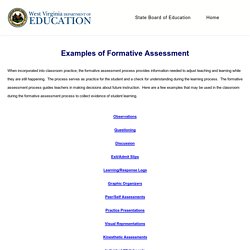
The process serves as practice for the student and a check for understanding during the learning process. The formative assessment process guides teachers in making decisions about future instruction. Here are a few examples that may be used in the classroom during the formative assessment process to collect evidence of student learning. Observations Questioning Discussion Exit/Admit Slips Learning/Response Logs Graphic Organizers Peer/Self Assessments Practice Presentations Visual Representations Kinesthetic Assessments Individual Whiteboards Laundry Day Four Corners Constructive Quizzes Think Pair Share Appointment Clock.
Formative Assessment Definition. Formative assessment refers to a wide variety of methods that teachers use to conduct in-process evaluations of student comprehension, learning needs, and academic progress during a lesson, unit, or course.
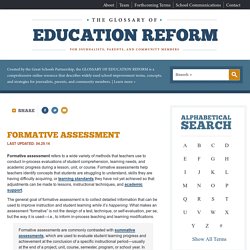
Formative assessments help teachers identify concepts that students are struggling to understand, skills they are having difficulty acquiring, or learning standards they have not yet achieved so that adjustments can be made to lessons, instructional techniques, and academic support. The general goal of formative assessment is to collect detailed information that can be used to improve instruction and student learning while it’s happening. What makes an assessment “formative” is not the design of a test, technique, or self-evaluation, per se, but the way it is used—i.e., to inform in-process teaching and learning modifications.
Formative vs summative assessment at UKCLE. Here Rob East of the University of Glamorgan sets out the differences and indeed the similarities between formative and summative assessment.
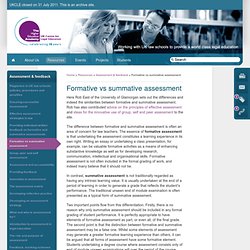
Rob has also contributed advice on the principles of effective assessment and ideas for the innovative use of group, self and peer assessment to the site. The difference between formative and summative assessment is often an area of concern for law teachers. The essence of formative assessment is that undertaking the assessment constitutes a learning experience in its own right. Formative Assessment Definition. What Are Formative Assessments and Why Should We Use Them?
"Informative assessment isn't an end in itself, but the beginning of better instruction.
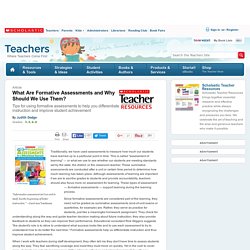
" —Carol Ann Tomlinson Traditionally, we have used assessments to measure how much our students have learned up to a particular point in time. This is called "assessment of learning" — or what we use to see whether our students are meeting standards set by the state, the district, or the classroom teacher. These summative assessments are conducted after a unit or certain time period to determine how much learning has taken place.